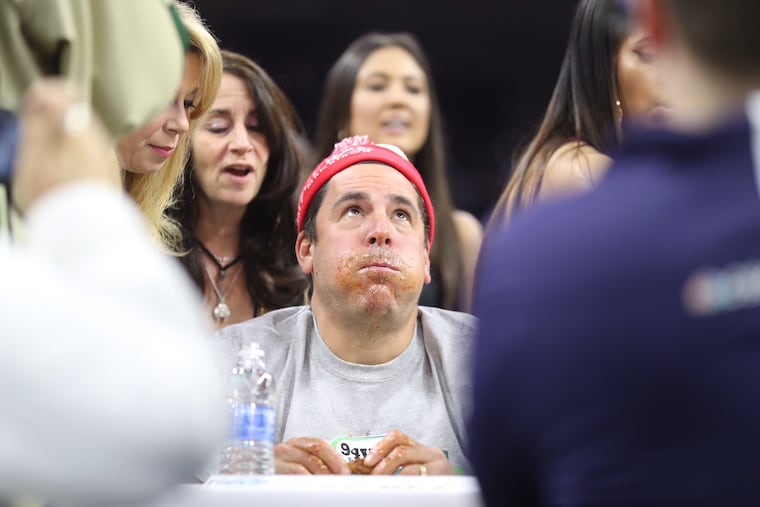Philly’s Wing Bowl competition is getting a documentary
Six years after it drew to a close, two filmmakers want to tell the story of Philly’s most infamous eating competition.

Starting in 1993, the Wing Bowl was a Friday-before-Super-Bowl-Sunday Philly tradition known for its endless flow of booze, arena-erupting antics, scantily clad “Wingettes,” and wildly competitive chicken wing eaters seeking gluttonous gold. But after 26 years of often-rowdy entertainment, fans and cocreator Angelo Cataldi were left with a sour taste.
In 2018, Cataldi and fellow Wing Bowl creator Al Morganti celebrated the final wing-eating competition at the Wells Fargo Center. By the end, Cataldi said there were too many scantily clad women and drunk fans “acting up” in the stands, and skeptics were growing more critical of its direction — including his wife, Gail.
“The last few years were a little sleazy,” Cataldi said. “It didn’t go the way we wanted it to. It wasn’t politically correct enough for where the world had gone in the 26 years [since] when we started it. There were a lot of critics of it, and for good reason.”
Now, documentarians Frank Petka and Pat Taggart of Owl Town Productions are shopping around a film that re-examines this uniquely Philly extravaganza.
Their documentary, No One Died: The Wing Bowl Story, chronicles the origins of the radio promotion and its evolution into a stunt. The name is a nod to Cataldi and Morganti saying “nobody died” as a barometer for the event’s success.
“It was never really about chicken wings,” Petka said. “It was about all the other things that went along with it — the pageantry and that yearning for fame. It was also a party, and Philly embraced it.”
Back in 1993, the Philadelphia Eagles lost to the Dallas Cowboys in the divisional round of the playoffs. The mounting disappointment inspired Cataldi and Morganti, then sports radio hosts at WIP, to start their own pre-Super Bowl tradition.
“It works mostly because the people of Philadelphia wanted to have this party,” Morganti said to The Inquirer in 2004, alluding to the fact that the Eagles hadn’t made it to the Super Bowl since 1981. “It’s fun. It’s kind of like the party we’re never going to have unfortunately.”
The inaugural event started out as a small show in what is now the Sheraton Philadelphia Downtown before expanding to the Wells Fargo Center in 2000. And every year, contestants arrived on floats or were escorted by the Wingettes, a group of women who often worked at the gentlemen’s clubs that sponsored the event.
The early years were mostly filled with novice competitors, who took stage names like Bill “El Wingador” Simmons (who ended up winning the bowl five times), “Rob the Slob,” and “Pot Pie the Sailor.” But eventually, professional eaters stepped in and the original 100-wing winning count got bigger and bigger, with the last winner, Molly Schuyler, eating 501 wings in 2018.
In 2018, the Eagles won the Super Bowl against the New England Patriots. By that point, WIP had been owned by Audacy for about two years. That year, the Wing Bowl hosted its final edition against the backdrop of a victorious football team — and mounting criticism about the event itself.
Taggart and Petka’s documentary will chronicle the bowl’s 26-year journey as narrated by Cataldi, who agreed to the project after seeing the duo’s film Billboard Boys. Neither WIP nor Morganti participated in the documentary.
Impressed by their work in the Allentown-based Billboard Boys, which followed three men who lived on a billboard for 261 days to win a house in a radio contest, Cataldi met Petka and Taggart in Sea Isle City, N.J., in August last year. And two weeks later, the filmmakers recorded the first interview with Cataldi.
“My fear for the whole thing was that someone from L.A. who didn’t understand the contest would come in and do a slam piece,” Taggart said. “You have to understand what it was.”
Petka and Taggart interviewed 40 past organizers, contestants, and attendees, including former Eagle Jason Kelce, former Wing Bowl commissioner and Eagles long snapper Jon Dorenbos, and competitive eaters Eric “Badlands” Booker and Schuyler.
WIP, which still employs Morganti, refused to share archival footage. But through Cataldi, who retired from the radio station in 2023, Petka and Taggart were able to collect old images and videos.
WIP did not respond to a request for comment.
Taggart said he aimed to show an unfiltered depiction of the Wing Bowl story — including the raunchier and unappetizing elements.
“You have to show the good, the bad, and the ugly,” he said. “We didn’t go into it with an agenda. It was important for me to find out what it meant to the people that were part of Wing Bowl. Like it or not, for some people this was a huge part of their identity.”
Cataldi said he hopes the film will “give people more of an appreciation for how strange it was.”
“It took everyday guys who were driving trucks and working hard for a living and put them in the middle of an arena where they got applause and attention,” Cataldi said. “They got to sample what it was like for them to be sports stars, and that’s a great thing for so many people. And we forgot that because of how it ended.”
Petka said the self-funded documentary forced him to dip into his savings account. But he and Taggart are shopping the documentary in hopes of making a splash at a film festival close to home.
“I don’t know what road this will take us, but it’s a truly unique Philadelphia thing,” Petka said. “We think it’s the greatest radio promotion of all time, or the worst event depending on who you talk to.”